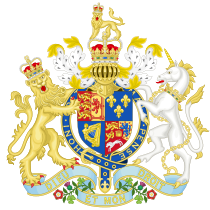The Act of Uniformity 1558 (1 Eliz 1 c 2)[a]The Act of Uniformity was passed on 28 April 1559,[1] but until the Acts of Parliament (Commencement) Act 1793 all Acts of Parliament came into effect on the first day of the parliamentary session. The first parliament of Elizabeth I met in January 1558, as the year 1559 did not begin until 25 March. Therefore, the Act of Uniformity was officially dated 1558 by the Statute Law Revision Act 1948. was one of the Acts of Parliament collectively known as the Elizabethan Religious Settlement, an attempt by Queen Elizabeth I to end the turmoil of the previous thirty years during which England had swung between Catholicism and Protestantism. The other key statute in the religious settlement was the Act of Supremacy, which established Elizabeth as the Supreme Governor of the Church of England.[2]
The Act of Uniformity obliged every person regardless of their religious beliefs to attend their parish church on Sundays and holy days or be subject to a fine of 12 pence,[3] the equivalent of about one day’s wages for a skilled tradesman.[4] Anyone who refused to attend church became known as a recusant,[3] from the Latin recusare, meaning “to refuse”.[5] The Act also imposed a Book of Common Prayer and made it illegal to attend a Catholic Mass.[6]
Observation and enforcement
The Act of Uniformity mandated the attendance at Church of England services, but did not require dissenting Catholics to participate. Sir Richard Shireburn, for instance, is reported to have conspicuously blocked his ears with wool whenever he attended church services. William Flamstead chose instead to read a book during the sermon. Others, such as the playwright William Shakespeare’s father John, excused themselves “for fear of process for debt”.[7]
Many Catholics, labelled church papists, observed public worship in their parish church but heard Mass secretly at home afterwards. Commonly only the men would go to church, as they were more vulnerable to the penalties imposed by the law than their wives.[8] But things became more difficult for recusants after the Council of Trent ruled in August 1562 that conformity with the Elizabethan Religious Settlement, even if only outwardly, was a sin in the eyes of the Catholic Church.[9]
Notes
| a | The Act of Uniformity was passed on 28 April 1559,[1] but until the Acts of Parliament (Commencement) Act 1793 all Acts of Parliament came into effect on the first day of the parliamentary session. The first parliament of Elizabeth I met in January 1558, as the year 1559 did not begin until 25 March. Therefore, the Act of Uniformity was officially dated 1558 by the Statute Law Revision Act 1948. |
|---|

